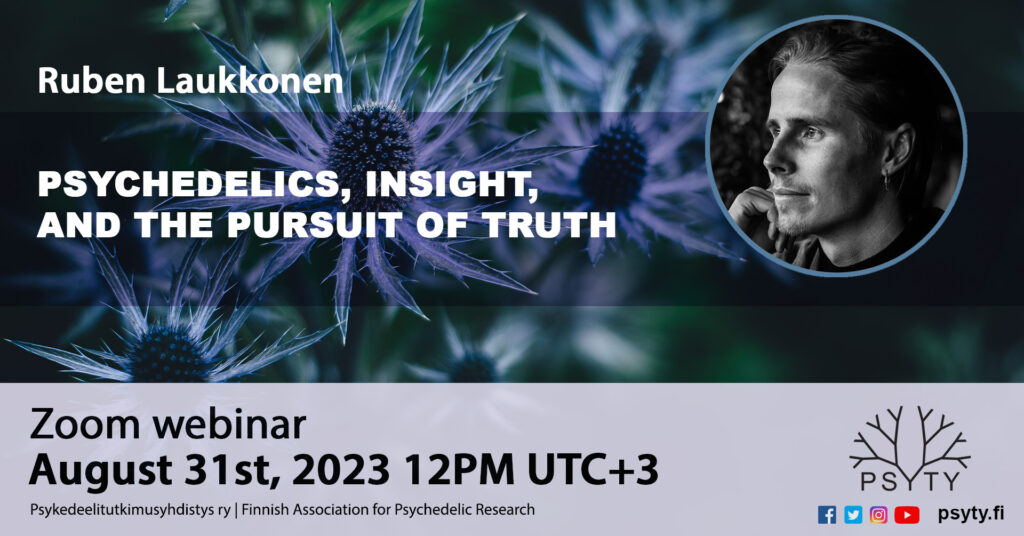Posts in Category: News
Psychedelic Psychiatry: What can we learn from the past? A recording of our webinar with Erika Dyck now available
In 1956, psychiatrist Humphry Osmond first used the word ‘psychedelic’ to describe the feelings and sensations associated with LSD. The term, conceived during his correspondence with the literary genius Aldous Huxley, was soon added to the English lexicon. In spite of the popular connotations now connected to the word, Osmond developed the term out of his LSD experiments with colleagues at the University of Saskatchewan. The experiments led him to propose a new theory of schizophrenia alongside a somewhat radical suggestion to treat alcoholism using LSD. In contrast with many of his psychiatric contemporaries, Osmond and his colleagues maintained that pharmacotherapies flourished most when combined with tenets of empathy, deference, and even ritual – features he learned from Indigenous ceremonies with plant medicines.
Although Osmond was not alone among his colleagues in the 1950s fascinated with the medical applications of psychedelics, his work in Canada made him a major figure in the history of LSD and addiction research, but also an awkward character in a looming countercultural revolution. LSD was banned from use by the late 1960s for a combination of moral and scientific reasons, but new developments in the 21st century are encouraging policy makers and researchers to revisit these historical studies.
In a webinar lecture held in June 2023, professor Erika Dyck from the University of Saskatchewan’s Department of History, we dove into the history of psychedelics and considered what we might learn from the past as we entertain a psychedelic renaissance. What do we have yet to learn from Indigenous roots of psychedelic ceremonies, or from missteps of the past that might warrant a retrial? We considered examples from the past and also looked at how historical ideas have continued to influence the psychedelic movement today.
The lecture is now available on our Youtube channel!
Psychoanalytic perspectives on psychedelic therapy – a recording of our webinar with Jeffrey Guss now available
What do psychedelics have to offer for dealing with existential crises? What are the correspondences between psychotherapy and shamanic healing? How can psychoanalytic perspectives enrich our understanding of psychedelics, and vice versa? In May 2023, we were led to explore these questions with psychiatrist, psychoanalyst, researcher and teacher Jeffrey Guss, whose experience includes working with psilocybin in a study for patients suffering from existential anxiety related to life-threatening illness.
The presentation begins with a description of psychedelic experiences that are not in the context of psychotherapy and describe correspondences between psychotherapy and shamanic healing. Guss then discusses the core processes that may occur as part of psychedelic psychotherapy, describing psychedelic phenomeonlogy in psychoanalytic and neuropsychoanalytic terms. In the last part of his talk, he offers a case presentation of a participant he worked with in the aforementioned study, and integrates elements of this individual’s psilocybin journey with the core processes described at the beginning of the talk. The lecture is followed by a Q&A section.
The lecture is now available on our Youtube channel!
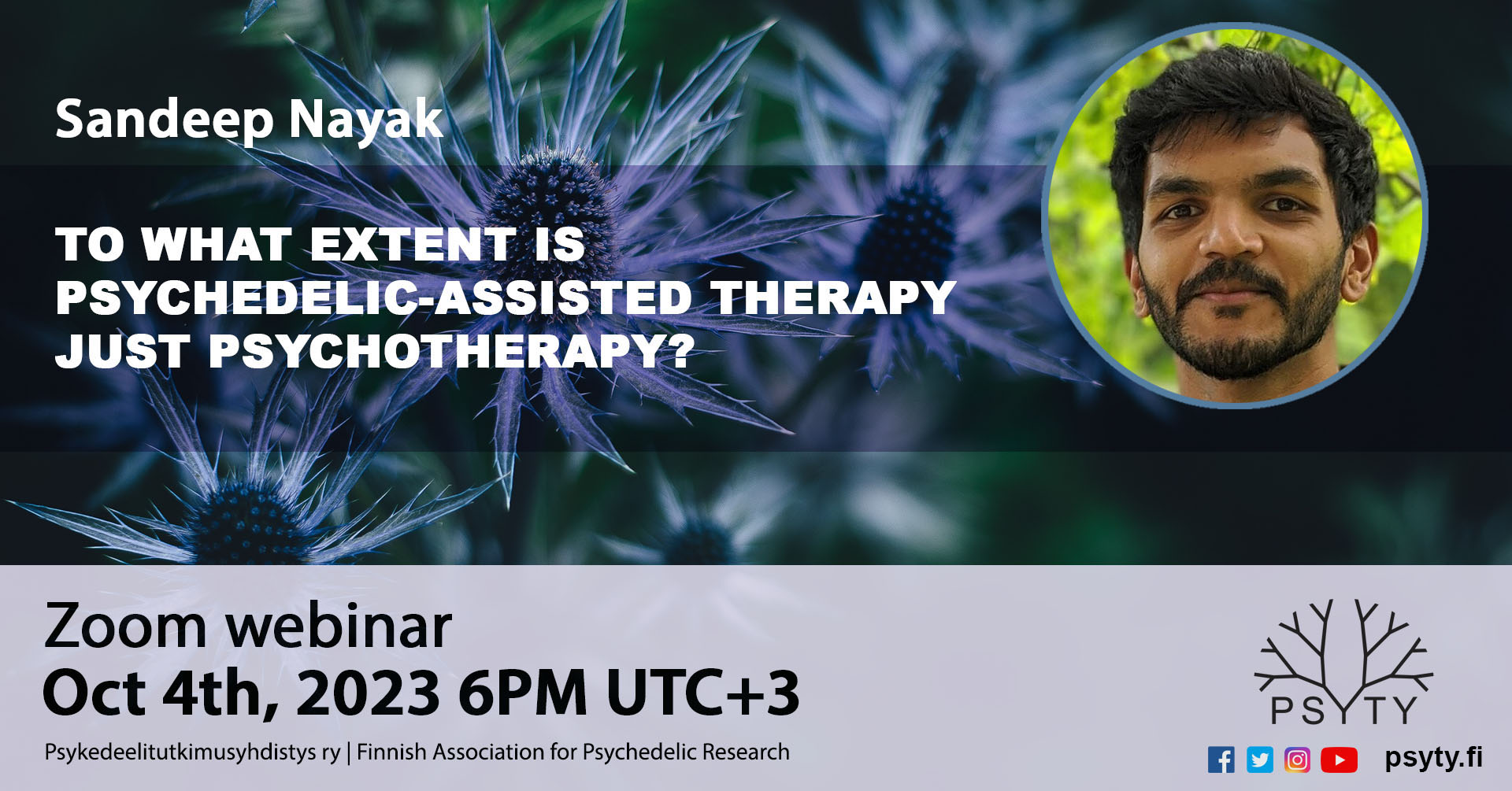
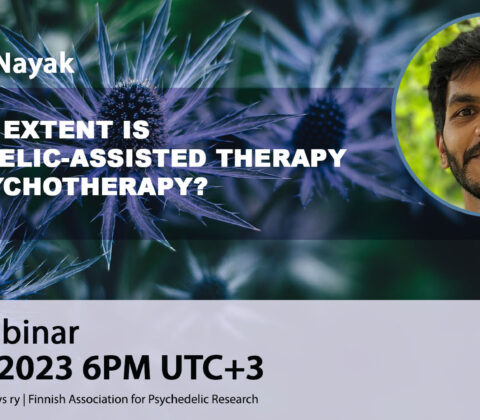
Webinar October 4th 2023 | Sandeep Nayak – To what extent is psychedelic-assisted therapy just psychotherapy?
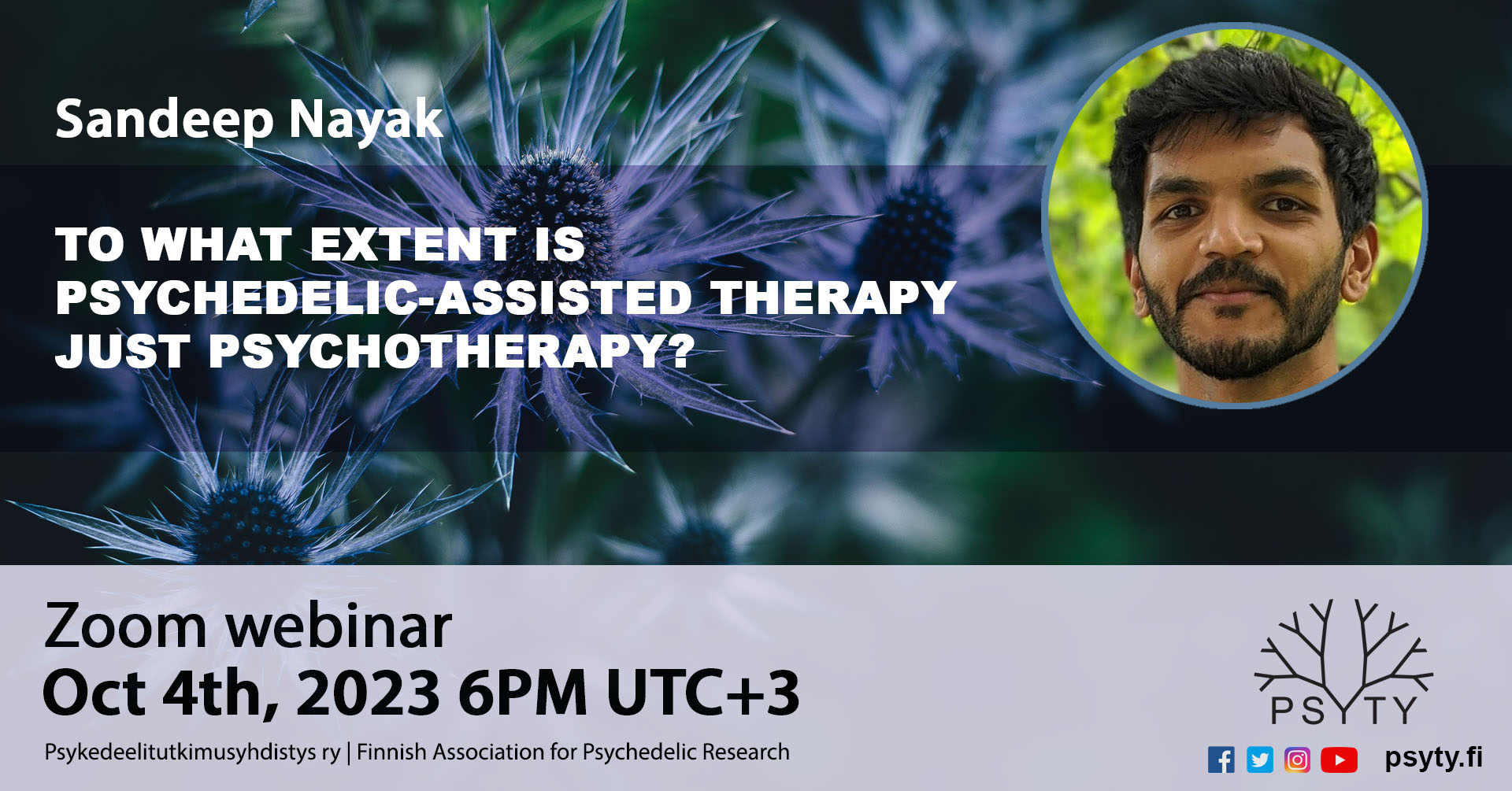
To what extent is psychedelic therapy just psychotherapy? How does psychedelic therapy relate to other forms of psychotherapy? What is psychotherapy, actually? On Wednesday October 4th at 6PM (UTC+3), we’ll dive into these questions in a webinar presentation offered by psychiatrist Sandeep Nayak, Assistant Professor at the Johns Hopkins Center for Psychedelic and Consciousness Research.
The lecture will begin by reviewing some evidence and controversy surrounding the idea that the subjective effects of psychedelic therapy are therapeutically active. Then we will discuss what psychotherapy is, and introduce the common factors of psychotherapy literature. This literature demonstrates that it is largely the shared features of psychotherapies, rather than their distinct features, that explains the bulk of therapeutic effects. Dr. Nayak will argue that psychedelic therapy, by exhibiting each common factor of psychotherapy and in some ways amplifying them, is psychotherapy. Finally, we will discuss problems of trial design methodology related to this.
The event contains a Q&A section. The total length is 2 hours.
Tickets are available from our web store. For members of the association who’ve paid their membership fee for 2023, the event is free of charge. If you want to pay your membership fee for this year or become a member, you’ll find our membership products on the main page of our web store. An email with a link for free registration to the event has been sent to members of the association. If you’re not sure if you’ve paid for your membership this year, feel free to ask us.
Sandeep Nayak is a psychiatrist and Assistant Professor at the Johns Hopkins Center for Psychedelic and Consciousness Research. He completed his MD at Brown University and his psychiatry residency at Johns Hopkins Hospital. He’s primarily focused on investigating psychedelics as treatments for psychiatric conditions, particularly substance use disorders and mood disorders.
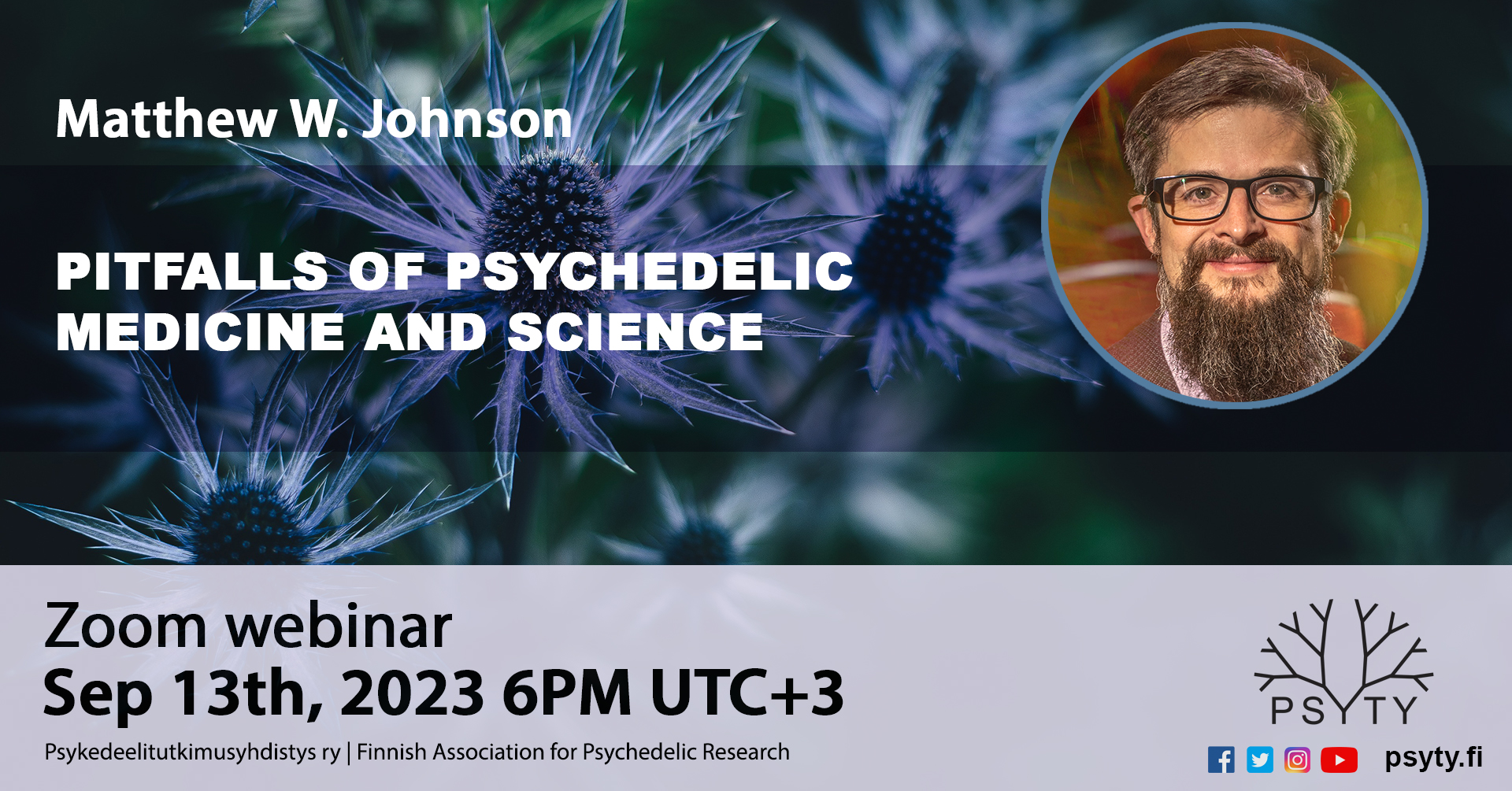
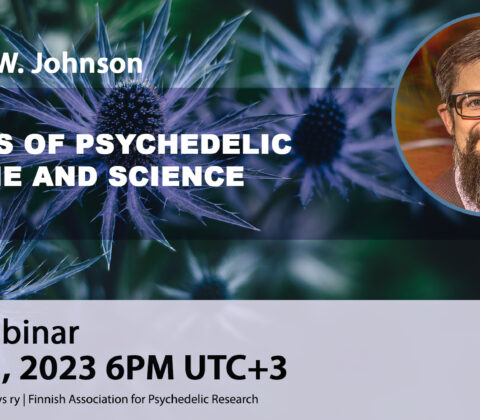
Webinar September 13th 2023 | Matthew W. Johnson – Pitfalls of Psychedelic Medicine and Science
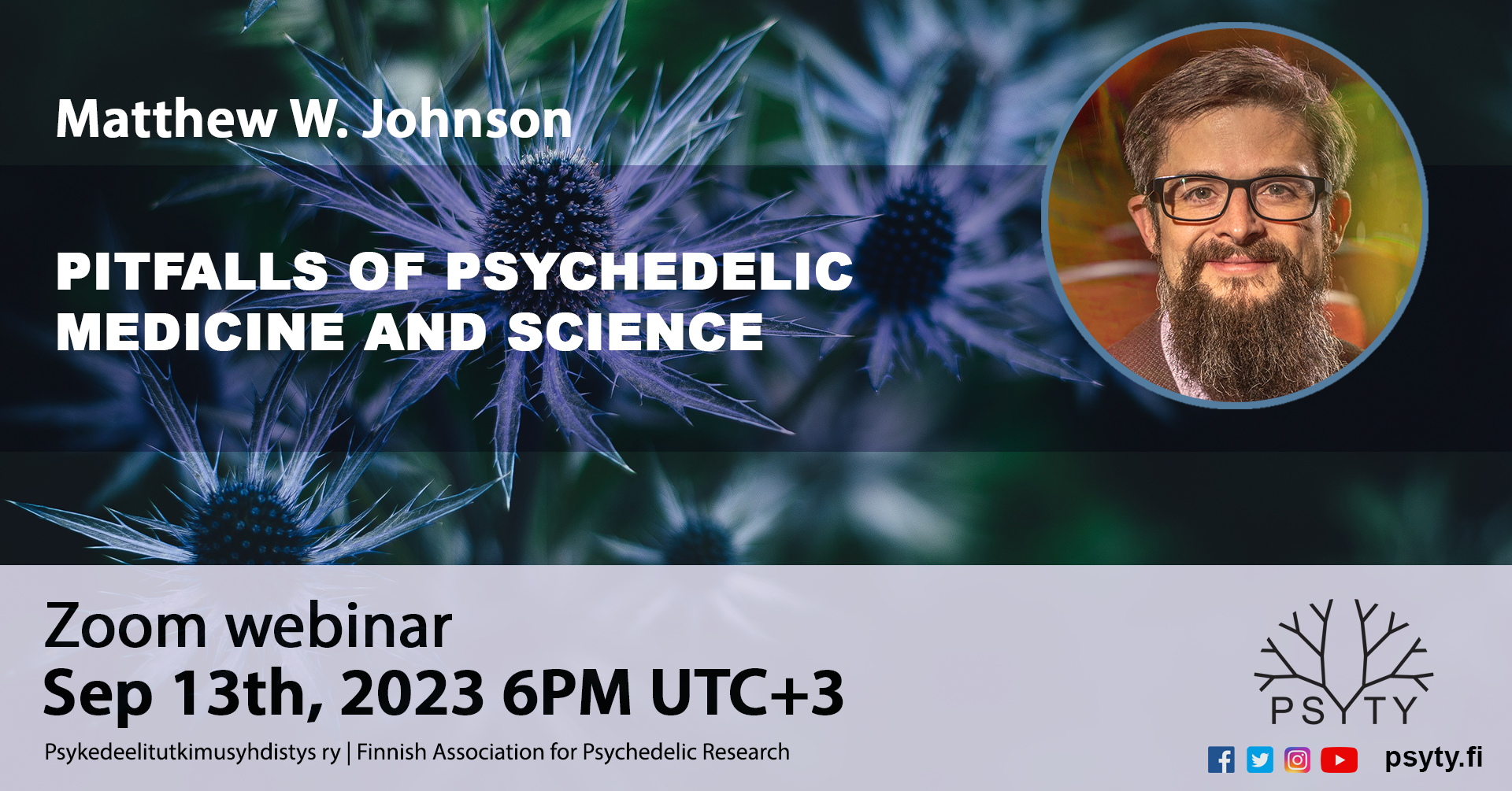
It is not uncommon for high dose psychedelic experiences to involve “big questions,” for example: What is the meaning of life? What is the nature of reality? Does God exist? In Psyty’s webinar presentation held on Wednesday, September 13th at 6PM UTC+3, Dr. Matthew W. Johnson will discuss the responsible handling of such experiences in therapeutic contexts.
Psychedelic experiences are believed to increase suggestibility and to occasion highly personal and meaningful experiences for patients. For this reason, a common but dangerous tendency for clinicians and scientists is to assume that psychedelic therapy constitutes an exception to many accepted clinical and ethical norms. Jonhson argues, however, that the intensity and meaningfulness of psychedelic effects call for even greater attention and adherence to the wisdom of clinical boundaries and norms.
Johnson argues that it is critical in clinical practice to let the patient determine her or his own metaphysical meaning, if any, from psychedelic experiences, rather than to impose or introduce the clinician’s own metaphysical beliefs, even ones that may seem innocuous to the clinician or scientist such as the “perennial philosophy.” Clinicians and scientists must avoid falling into the roles of guru or religious leader, and only introduce concepts grounded in their professional, empirically informed expertise.
Finally, regarding the science of psychedelics, much has been stated on the propensity of psychedelics to “expand consciousness”, and scientists have viewed psychedelics as tools to understand the “nature of consciousness.” Johnson calls for scientists to use precision when discussing concepts referred to as “consciousness” such as phenomenal consciousness, access consciousness, and self-concept, and be cautious to not overstate what is scientifically known regarding the relation between psychedelics and these concepts. He argues that scientists should do a better job with phenomenology regarding psychedelics and these concepts, meaning that we need to be judicious in distinguishing insights that people claim to have about, for example, phenomenal consciousness in psychedelic experiences, from what we can objectively claim to have learned about phenomenal consciousness from psychedelic research.
Tickets are available from our web store. For members of the association who’ve paid their membership fee for 2023, the event is free of charge. If you want to pay your membership fee for this year or become a member, you’ll find our membership products on the main page of our web store. An email with a link for free registration to the event has been sent to members of the association. If you’re not sure if you’ve paid for your membership this year, feel free to ask us.
Matthew W. Johnson, Ph.D., is The Susan Hill Ward Endowed Professor of Psychedelics and Consciousness Research at Johns Hopkins. Working with psychedelics since 2004, he has played a role in the modern-day revival of psychedelic research. He has published research on psychedelics and mystical experience, personality change, tobacco smoking cessation, cancer distress treatment, and depression treatment. In 2021 he received as principal investigator the first grant in about 50 years from the US government to administer a classic psychedelic as a treatment, specifically psilocybin for tobacco addiction. He is also known for his expertise in behavioral economics, addiction, sexual risk behavior, and research with a wide variety of drug classes. He has been Interviewed by Anderson Cooper on 60 Minutes, the New York Times, the Washington Post, the Wall Street Journal, CNN, NPR, Fox News, BBC, the Lex Fridman Podcast, and in Michael Pollan’s book How to Change Your Mind.
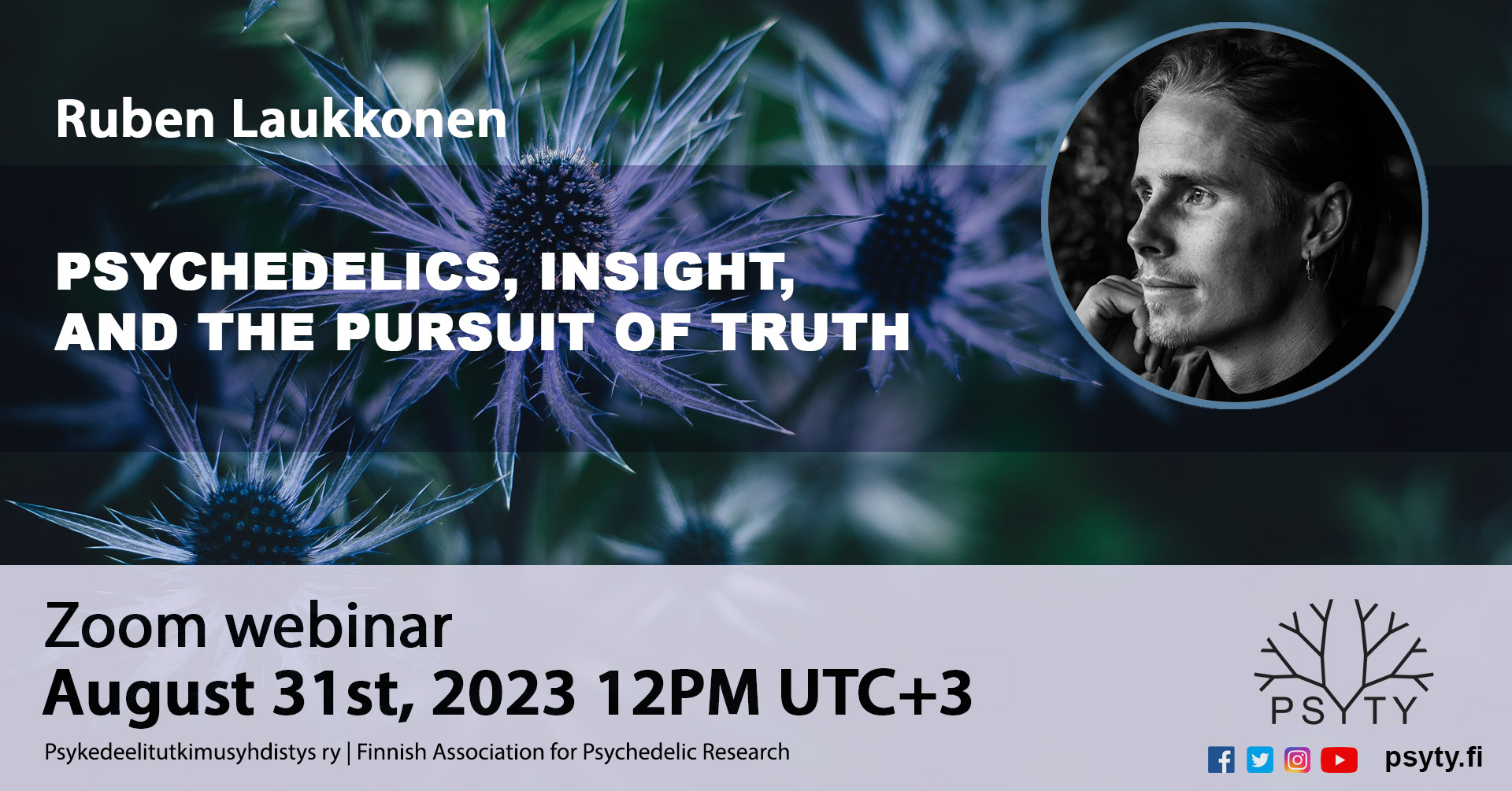
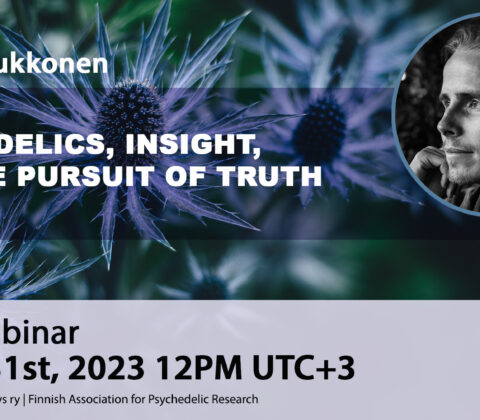
Webinar August 31st 2023 | Ruben Laukkonen – Psychedelics, insight, and the pursuit of truth
The emergence of insights during psychedelics is remarkably important for therapeutic progress. Insights can be a source of creativity, discovery, and even healing, but they can also mark the beginning of a delusional episode, or potentially entrench and perpetuate false beliefs. From this starting point, neuroscientist Ruben Laukkonen will present a fascinating webinar lecture on August 31st at 12PM UTC+3.
Do note the unusual time – due to the time zone of the lecturer, the webinar starts at noon (Finnish time).
In the talk, Dr. Laukkonen will review evidence from a series of experiments that expose both the light and the dark side of insight. These findings will be integrated within an active inference account, wherein feelings of insight can give rise to, and entrench, new beliefs and perspectives during psychedelic experiences. Put simply, the combination of intense insights and relaxed beliefs creates the profound potential for plasticity and change. However, this plasticity risks the insight-catalysed lodging of false or maladaptive beliefs (possibly triggering mania). These ideas will be grounded by discussing the different kinds of insights that arise and how to nudge them in the “right” direction, and how we might define that direction.
Tickets are available from our web store. For members of the association who’ve paid their membership fee for 2023, the event is free of charge. If you want to pay your membership fee for this year or become a member, you’ll find our membership products on the main page of our web store. An email with a link for free registration to the event has been sent to members of the association. If you’re not sure if you’ve paid for your membership this year, feel free to ask us.
Dr. Ruben Laukkonen is a principal investigator and lecturer at Southern Cross University and holds honourary fellowships at the Vrije Universiteit Amsterdam and The University of Queensland. Ruben’s research uncovers empirically grounded and experientially authentic models of meditation, insight, and non-duality. Using a combination of methods including behaviour, neuroimaging, machine learning, and phenomenology, he is investigating some of the rarest states of consciousness available to human beings. He has published articles in leading journals, regularly speaks at international conferences, consults for the Organisation of Economic Cooperation and Development. Ruben has an eclectic contemplative background, including traditions such as Zen, Advaita, and Theravada.
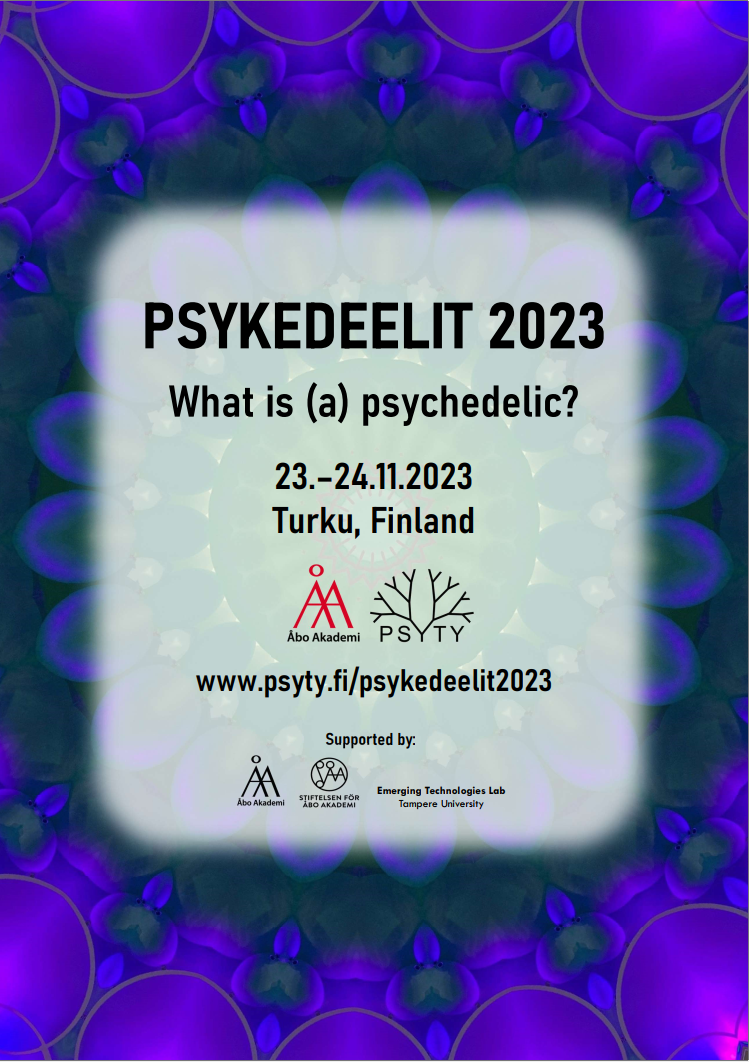
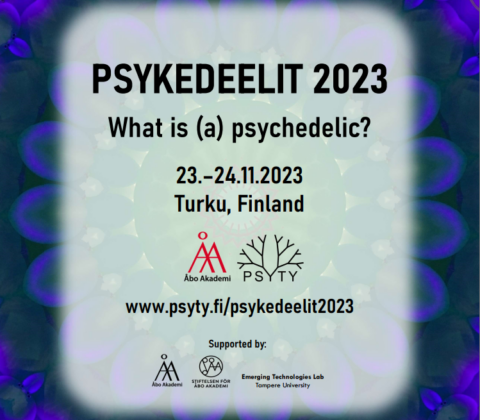
The 2nd Finnish Interdisciplinary Conference on Psychedelics in November
Psykedeelit 2023
The 2nd Finnish Interdisciplinary Conference on Psychedelics
What is (a) psychedelic?
November 23–24, 2023
Åbo Akademi University, Turku, Finland
In collaboration with Åbo Akademi University and the Emerging Technologies Lab of Tampere University, we are organizing Psykedeelit 2023 – The 2nd Finnish Interdisciplinary Conference on Psychedelics, in Turku, Finland, on November 23–24, 2023. This year’s conference focuses on the specific theme of What is (a) psychedelic?
Invited keynote speakers of the conference are psychologist Dr. Max Wolff (Charité – Berlin University of Medicine & MIND Foundation), who will talk about how psychedelic-assisted psychotherapy differs from ordinary psychotherapy, and evolutionary anthropologist Dr. Manvir Singh (Institute for Advanced Study, Toulouse), who will talk about psychedelics in relation to shamanism and indigenous cultures. In addition, we will hear over 25 other oral presentations on psychedelics and the psychedelic, by researchers from a variety of fields of science from Finland and abroad. Academic posters will also be presented.
Registration is now open! Proposals for academic posters may also still be submitted.
See https://psyty.fi/psykedeelit2023 for registration, details, and an updating program.
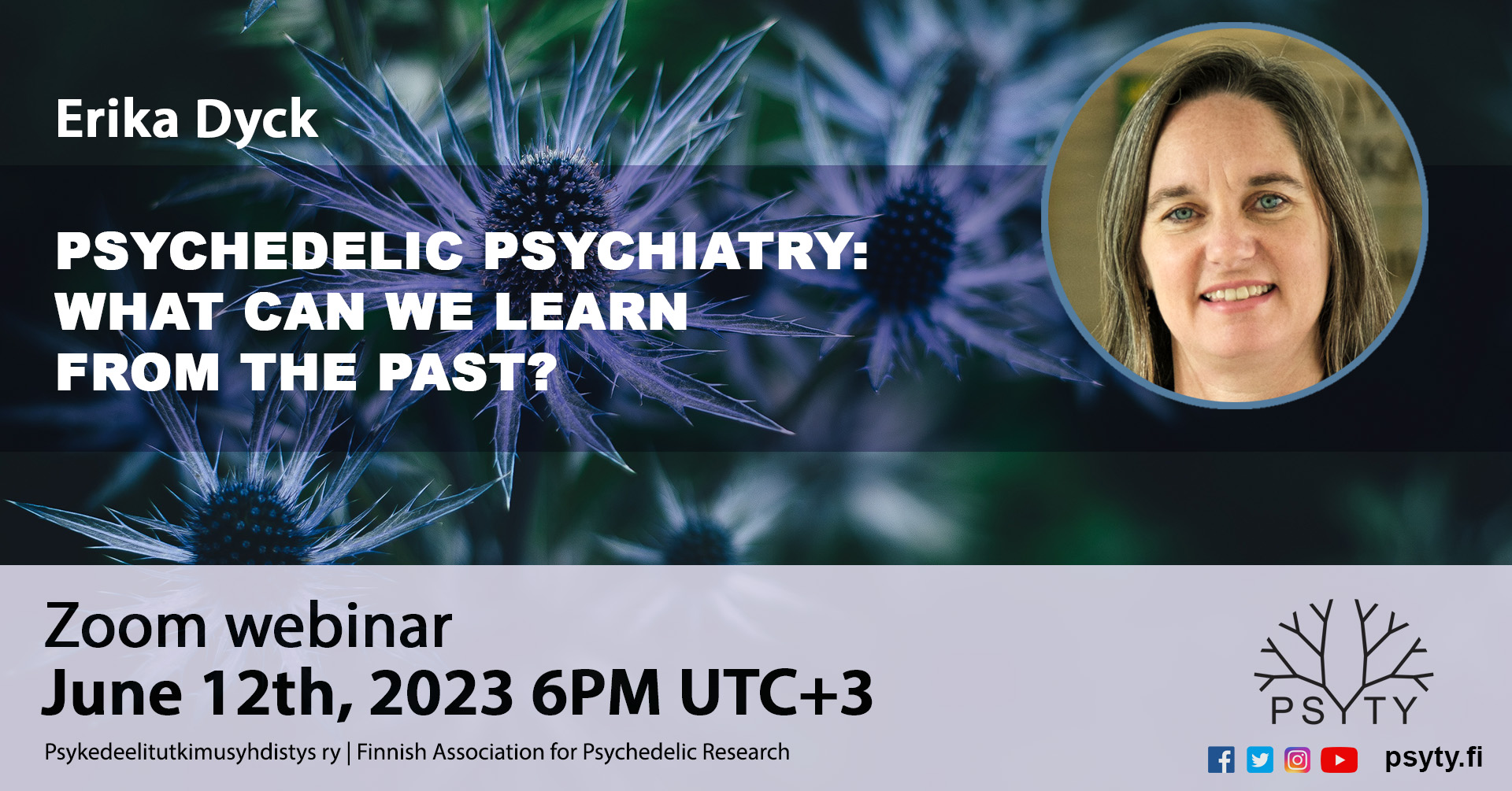
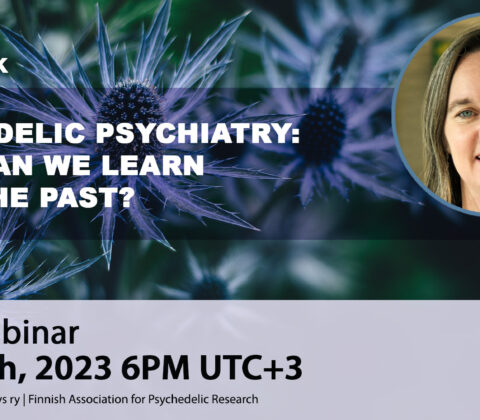
Webinar June 12th 2023. Erika Dyck – Psychedelic Psychiatry: What can we learn from the past?
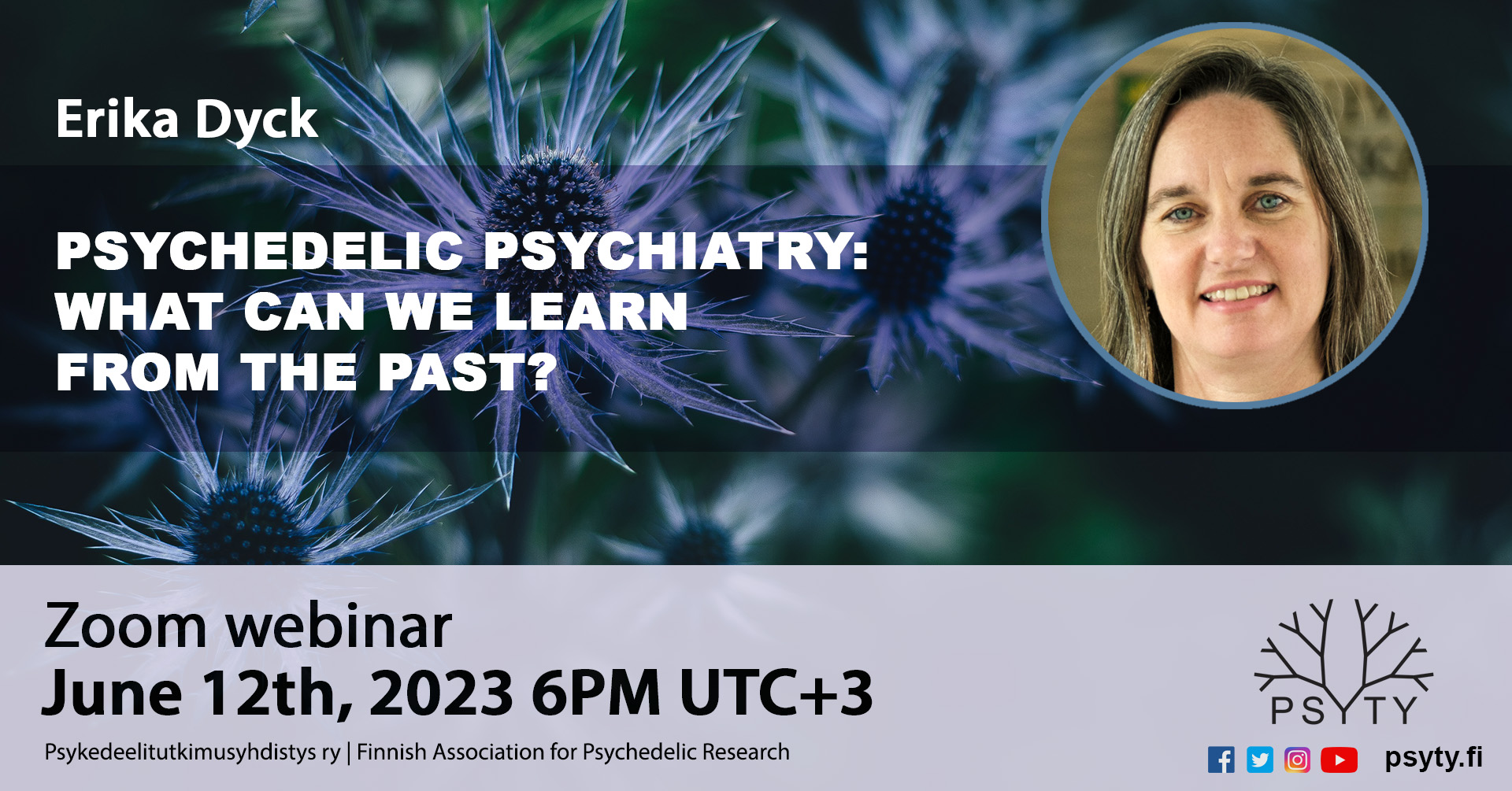
In 1956, psychiatrist Humphry Osmond first used the word ‘psychedelic’ to describe the feelings and sensations associated with LSD. The term, conceived during his correspondence with the literary genius Aldous Huxley, was soon added to the English lexicon. In spite of the popular connotations now connected to the word, Osmond developed the term out of his LSD experiments with colleagues at the University of Saskatchewan. The experiments led him to propose a new theory of schizophrenia alongside a somewhat radical suggestion to treat alcoholism using LSD. In contrast with many of his psychiatric contemporaries, Osmond and his colleagues maintained that pharmacotherapies flourished most when combined with tenets of empathy, deference, and even ritual – features he learned from Indigenous ceremonies with plant medicines.
Although Osmond was not alone among his colleagues in the 1950s fascinated with the medical applications of psychedelics, his work in Canada made him a major figure in the history of LSD and addiction research, but also an awkward character in a looming countercultural revolution. LSD was banned from use by the late 1960s for a combination of moral and scientific reasons, but new developments in the 21st century are encouraging policy makers and researchers to revisit these historical studies.
On Monday, June 12th at 6PM UTC+3, in a Zoom webinar presented by professor Erika Dyck from the University of Saskatchewan’s Department of History, we will dive into the history of psychedelics and consider what we might learn from the past as we entertain a psychedelic renaissance. What do we have yet to learn from Indigenous roots of psychedelic ceremonies, or from missteps of the past that might warrant a retrial? We will consider examples from the past and also look at how historical ideas have continued to influence the psychedelic movement today.
Tickets are available from our web store. For members of the association who’ve paid their membership fee for 2023, the event is free of charge. If you want to pay your membership fee for this year or become a member, you’ll find our membership products on the main page of our web store. An email with a link for free registration to the event has been sent to members of the association. If you’re not sure if you’ve paid for your membership this year, feel free to ask us.
Erika Dyck is a Professor and a Canada Research Chair in the History of Health & Social Justice at the University of Saskatchewan’s Department of History. Her interdisciplinary research brings social sciences and humanities perspectives to scientific and medical subjects. Her work has been published in medical, legal, economic, literary, philosophical, anthropological and historical venues. She is the author of several books, including: Psychedelic Psychiatry: LSD from Clinic to Campus (Johns Hopkins, 2008; University of Manitoba Press, 2011); Managing Madness: the Weyburn Mental Hospital and the Transformation of Psychiatric Care in Canada (University of Manitoba Press, 2017), which won the Canadian Historical Association Prize for best book in Prairie History; and The Acid Room: the psychedelic trials and tribulations of Hollywood Hospital (2022), nominated for Saskatchewan and BC book awards. She is also the co-editor of Psychedelic Prophets: The Letters of Aldous Huxley and Humphry Osmond (2018); and A Culture’s Catalyst: Historical Encounters with the Native American Church in Canada and Peyote (2016), and a forthcoming collection with Chris Elcock, Expanding Mindscapes: a global history of psychedelics (MIT Press 2023). She is the co-editor of the Canadian Journal of Health History (2015-present), the President of the [International] Alcohol and Drugs History Society; and co-editor of 2 international books series with McGill-Queen’s Press – History of Health and Medicine, and Intoxicating Histories.
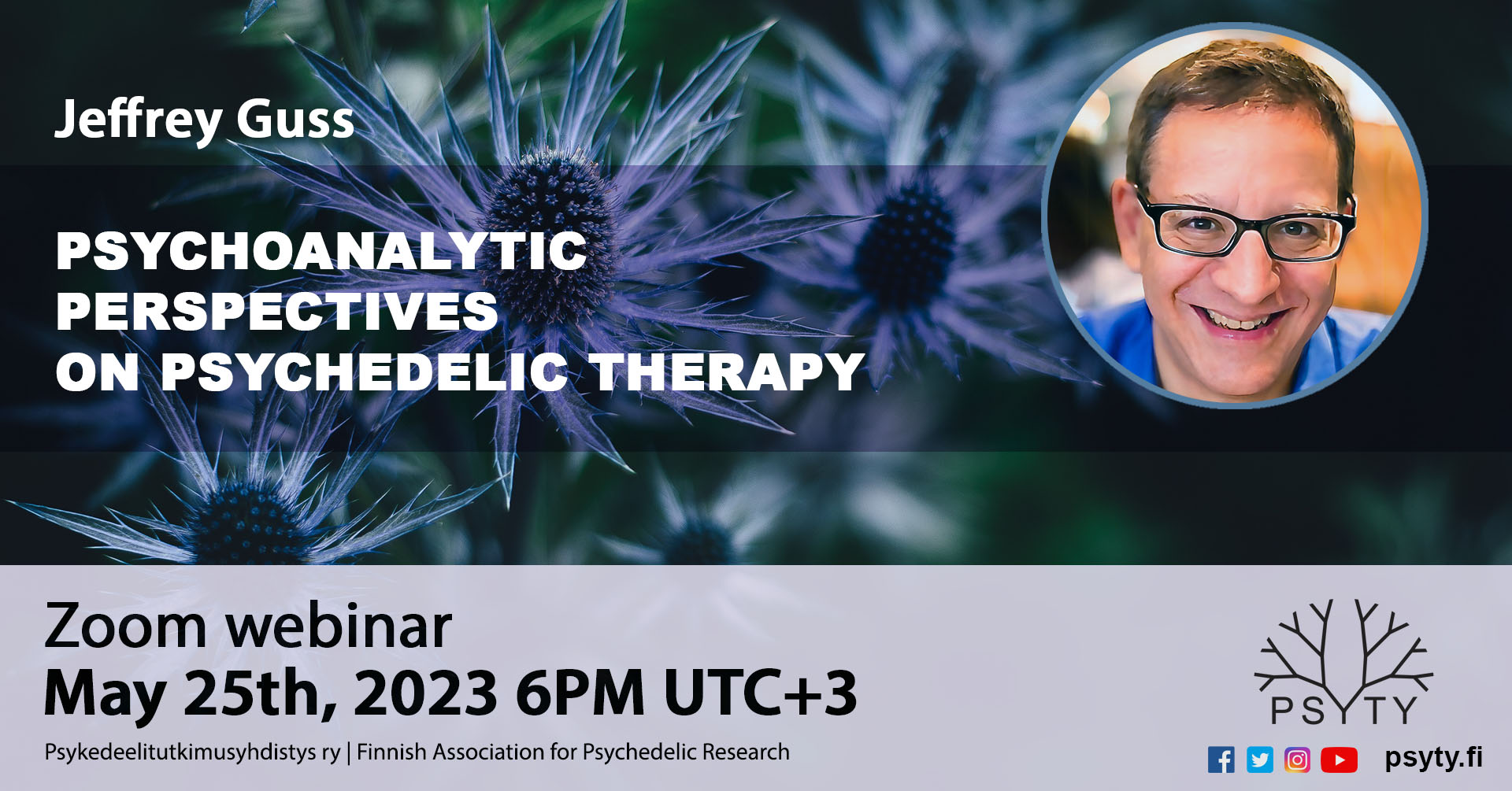
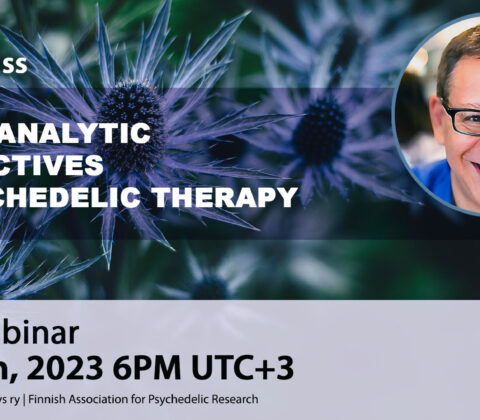
Webinar May 25th 2023. Jeffrey Guss: Psychoanalytic Perspectives on Psychedelic Therapy

What do psychedelics have to offer for dealing with existential crises? What are the correspondences between psychotherapy and shamanic healing? How can psychoanalytic perspectives enrich our understanding of psychedelics, and vice versa? We’ll be spending time with these questions on Thursday, May 25th at 6PM UTC+3 in a Zoom presentation by psychiatrist, psychoanalyst, researcher and teacher Jeffrey Guss, whose experience includes working with psilocybin in a study for patients suffering from existential anxiety related to life-threatening illness.
The presentation will begin with a description of psychedelic experiences that are not in the context of psychotherapy and describe correspondences between psychotherapy and shamanic healing. Guss will then discuss the core processes that may occur as part of psychedelic psychotherapy, describing psychedelic phenomeonlogy in psychoanalytic and neuropsychoanalytic terms. In the last part of his talk, he will offer a case presentation of a participant he worked with in the aforementioned study. Following the case presentation, he will integrate elements of this individual’s psilocybin journey with the core processes described at the beginning of the talk.
Tickets are available from our web store. For members of the association who’ve paid their membership fee for 2023, the event is free of charge. If you want to pay your membership fee for this year or become a member, you’ll find our membership products on the main page of our web store. An email with a link for free registration to the event has been sent to members of the association. If you’re not sure if you’ve paid for your membership this year, feel free to ask us.
Jeffrey Guss, MD is a psychiatrist, psychoanalyst, researcher, and teacher with specializations in psychoanalytic therapy and psychedelic therapy. He was Co-Principal Investigator and Director of Psychedelic Therapy Training for the NYU School of Medicine’s study on psilocybin-assisted psychotherapy in the treatment of cancer related existential distress. He is currently a Lead Trainer with Fluence, with a focus on the integration of psychedelic therapy with psychoanalysis. He is a study therapist in the NYU study on Psilocybin-Assisted treatment of Major Depressive Disorder. He has published on the integration of Acceptance and Commitment Therapy with psychedelic assisted therapy for MDD in Journal of Contextual and Behavioral Science and the influence of therapists’ first-hand experience with psychedelics on psychedelic-assisted psychotherapy research. He is an Instructor and Mentor with the California Institute of Integral Studies’ Center for Psychedelic Therapies and maintains a private practice in New York City.
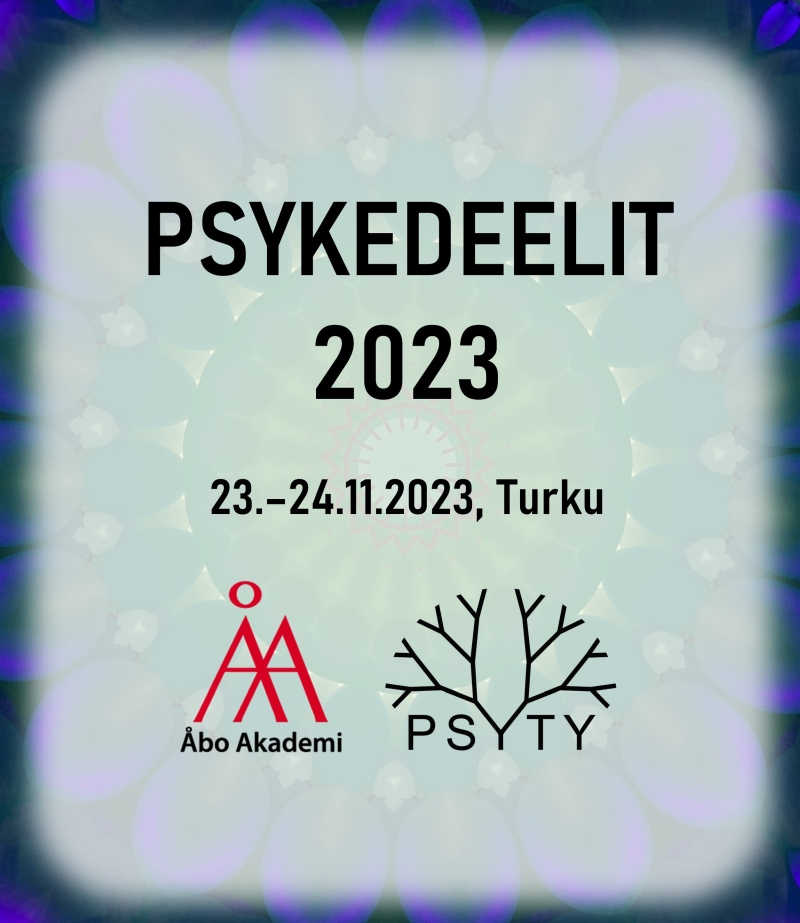
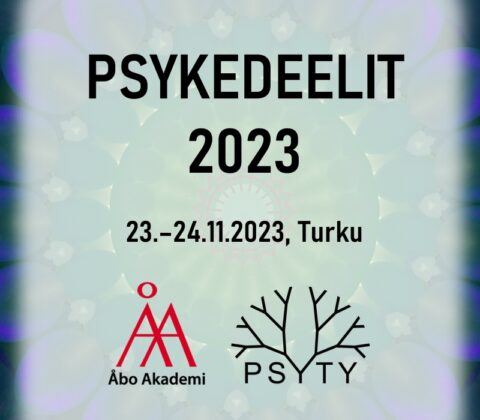
Psykedeelit 2023 – The 2nd Finnish Interdisciplinary Conference on Psychedelics

Psykedeelit 2023
The 2nd Finnish Interdisciplinary Conference on Psychedelics
What is (a) psychedelic?
November 23–24, 2023
Åbo Akademi University, Turku, Finland
In collaboration with Åbo Akademi University, we are organizing Psykedeelit 2023 – The 2nd Finnish Interdisciplinary Conference on Psychedelics, in Turku, Finland, on November 23–24, 2023. This year’s conference focuses on the specific theme of What is (a) psychedelic?
Invited keynote speakers of the conference are psychologist Dr. Max Wolff (Charité – Berlin University of Medicine & MIND Foundation), who will talk about how psychedelic-assisted psychotherapy differs from ordinary psychotherapy, and evolutionary anthropologist Dr. Manvir Singh (Institute for Advanced Study, Toulouse), who will talk about psychedelics in relation to shamanism and indigenous cultures.
The conference is multidisciplinary to the bone and open to researchers, students, and others whose work is related to psychedelics in any field of science (e.g., psychologists, physicians, pharmacologists, sociologists, philosophers, theologians, anthropologists, gender studies researchers, artists).
The Call for Proposals for talks and posters is open until May 31st, and registration is also now open.
See https://psyty.fi/psykedeelit2023 for details.
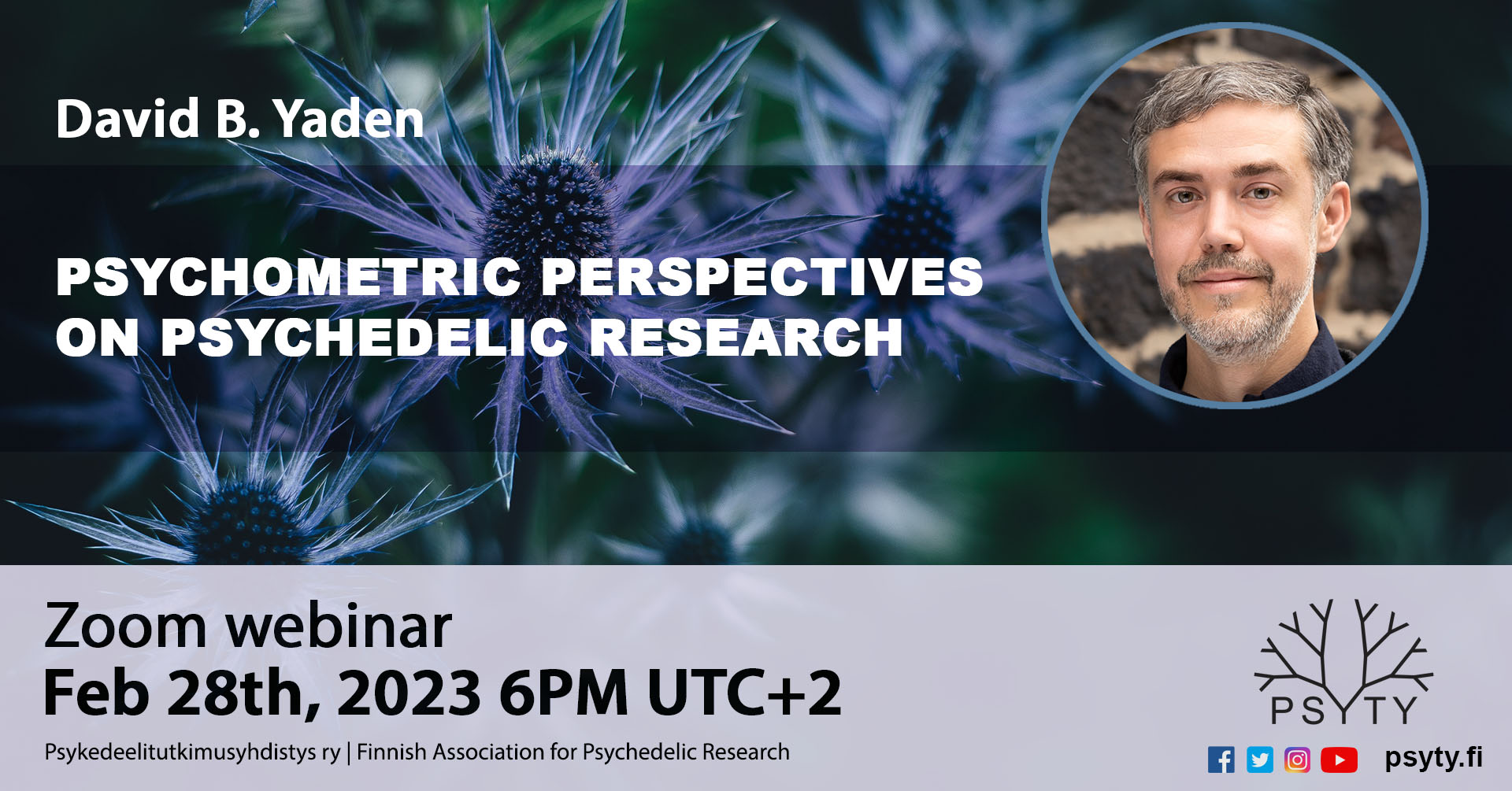
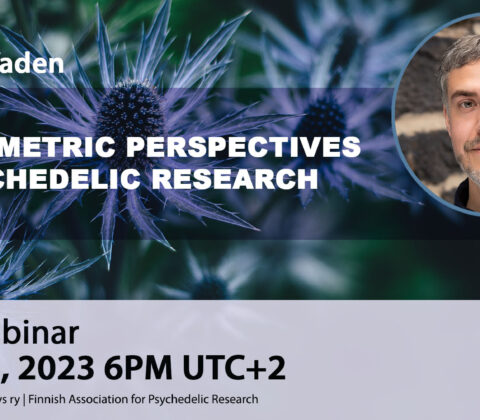
Webinar February 28th 2023. David B. Yaden: Psychometric Perspectives on Psychedelic Research
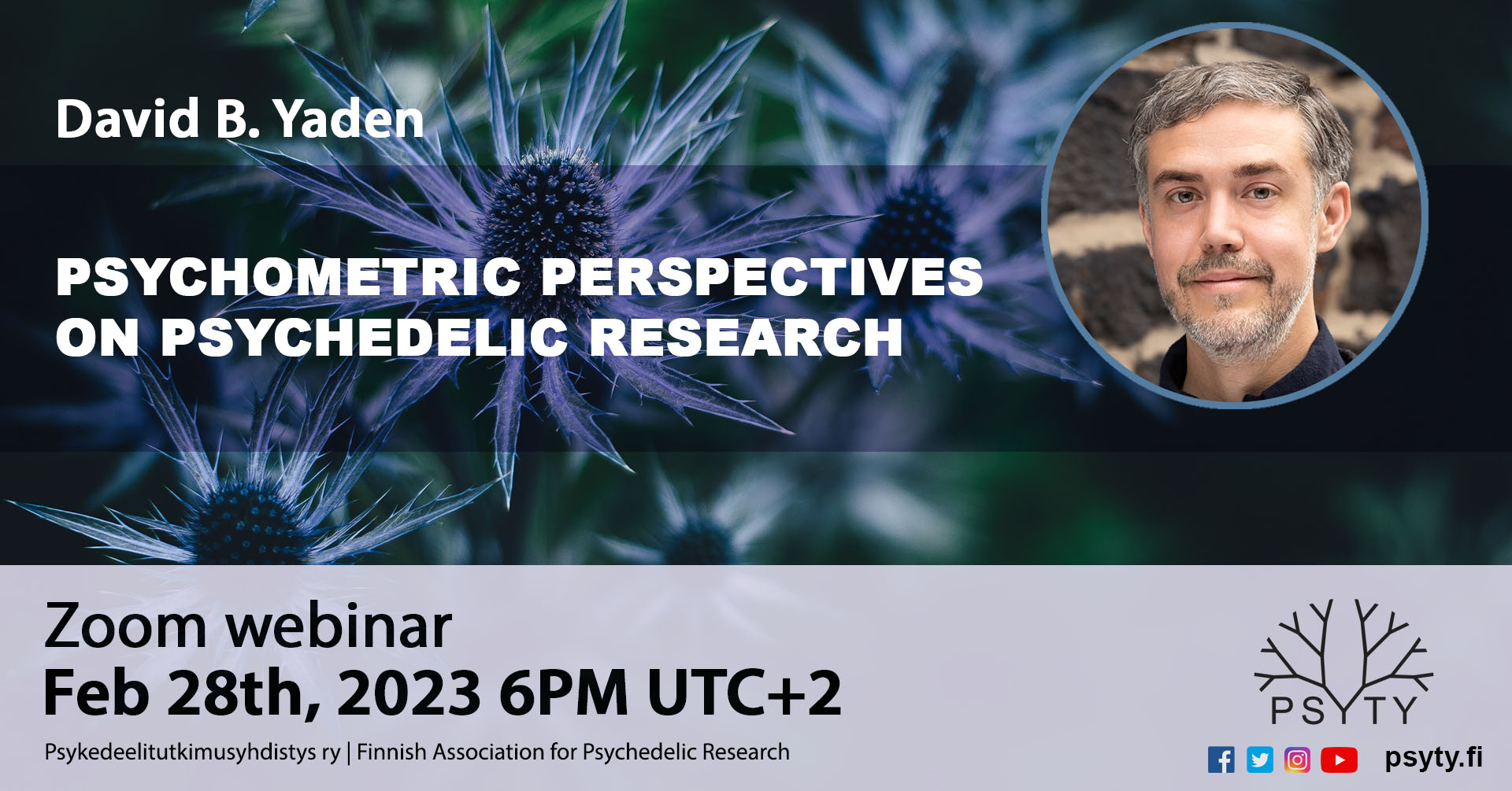
What is a psychedelic experience like? That is, what does it feel like and what other kinds of experiences are similar? And how can such a subjective event be measured? These are some of the questions studied by David B. Yaden, PhD, Assistant Professor at Johns Hopkins University School of Medicine working in The Center for Psychedelic and Consciousness Research.
Dr. Yaden is interested in understanding how brief experiences can result in long-term changes to well-being, and studies the subjective and behavioral effects of psychedelics and their treatment potential, the ethical issues involved, as well as consciousness, beliefs, religion and spirituality. His recent book with Andrew Newberg, The Varieties of Spiritual Experience, has received wide-ranging praise as an update and extension of William James’ 1902 classic, The Varieties of Religious Experience.
On Tuesday, February 28th at 6PM UTC+2, Dr. Yaden will give a Zoom presentation on the psychometric self-report measures that are currently used in psychedelic research, and discuss their limitations and ways to improve and standardize these measures.
Unlike usually, this webinar will not be recorded, so being there is the only way to hear it!
Tickets are available from our web store. For members of the association who’ve paid their membership fee for 2023, the event is free of charge. If you want to pay your membership fee for this year or become a member, you’ll find our membership products on the main page of our web store. An email with a link for free registration to the event has been sent to members of the association. If you’re not sure if you’ve paid for your membership this year, feel free to ask us.

